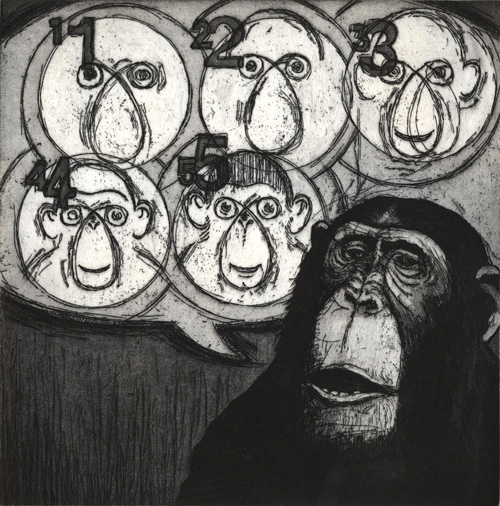 By the time they slid out of the cooler and onto our front porch, the ice surrounding their slippery bodies was nearly melted.
By the time they slid out of the cooler and onto our front porch, the ice surrounding their slippery bodies was nearly melted.
“Six silver Steelhead. Fresh out of the Klamath River,” announced my mother.
They were sterling, pewter, and black. Yellow-eyed and long as my legs.
My mother pulled out a buck horn knife and made a line, clean and silent across the soft belly. A drop of rich red splattered between her pink toenails. She shoved the knife in deeper. I heard the sound of thin bones snapping like taut strings, the steel point of the knife scraping along a fine backbone. Her fingers full of turquoise rings, yanked at things inside of the fish.
I was afraid of her. She wasn’t predictable when she was drinking.
“Look at these,” she said to me.
In her hand she held out three round fleshy balls. I winced. She pushed them closer to my face. They were like antique marbles, giant freshwater pearls—rare eggs with deep green and creamy swirls. They glistened in her palm.
“Aren’t these amazing?” she said, squeezing my arm. I didn’t want to touch them. And then I did. Fish guts. Soft, wobbly, and wet.
Perhaps now, so many seasons later, and her gone, I understand it better.
It was my mother who taught me beauty could exist in anything.
Melissa Cistaro’s stories have been published in the New Ohio Review, Anderbo.com, Sparkle and Blink, and in the anthology CHERISHED: 21 Writers on Animals They Have Loved and Lost. Most recently her essay “The Undertow” was a semi-finalist in the Notes & Words national essay contest. She lives with her family in San Rafael California.
Illustration by Marc Snyder

7 comments
gopika nath says:
May 16, 2012
Macabre but ends with a profound message. Beautifully told. Short, lucid, evocative and the end tugs at the heart strings. Lovely. Thank you
JP Reynolds says:
May 17, 2012
I love Melissa’s work, though as I was reading this piece I was wondering where it was going. I got a shiver as I read the last line. Stab-me-in-the-heart beautiful!
L says:
May 18, 2012
lovely! Of course, as a child, I was likely to have been the one to grab them out of the fish and show my mom! Your turn of phrase is delightful. My only critique is that at the end I would have liked to have seen your change, rather than be told about it…
Heather says:
May 18, 2012
This piece is chilling and exquisite, capturing in one perfect scene the complex knot of fear and love a child feels for a mother capable of intimidation and inspiration in equal measure.
Yvonne M. Sode says:
Sep 16, 2012
Having lost my mom two years ago, I truly felt this piece. As Melissa’s ending is real to many who received such profound insights from their mother.
Dani C Wheller says:
Oct 23, 2012
William Cazella, Enjoy the class and hope to do well.
Barnstorm » Blog Archive » Nonfiction Pizza Party says:
Oct 30, 2012
[…] version of their previous setup. The 16 essays in the latest issue are tongue-in-cheek, lyrical, minimalist, and heartbreaking. The issue’s best metaphor is even better out of context: “He was a teddy […]